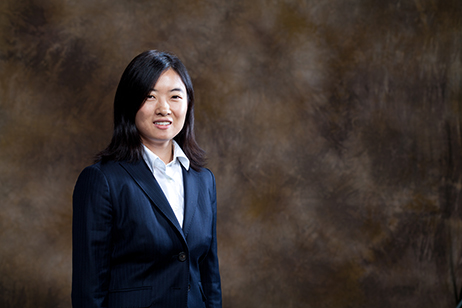NSF Early Career Award Will Help Researcher Advance Work on Wireless Sensor Networks
FAYETTEVILLE, Ark. – Jing Yang, an assistant professor in the College of Engineering at the University of Arkansas, has received a $500,000 Faculty Early Career Development Program award from the National Science Foundation to continue developing sensing and transmission systems for energy-harvesting, wireless sensor networks.
Energy-harvesting, wireless sensor networks are systems that include collaborating embedded devices, such as sensor nodes, that are capable of sensing, computation and communication. They are often used for application-specific analysis, such as environmental monitoring in homes or factories. The sensors perform long-range communications that are impossible or impractical to implement with the use of wires.
These networks use energy from the ambient environment – including solar power, but also sources such as vibration and wind – to collect and transmit vast amounts of data. However, they struggle to maintain reliable collection, transmission and analysis of data because the energy supply for this process can be random, scarce and inconsistent.
Yang is working on a set of algorithms that will lead to the design of new systems that can dynamically and intelligently allocate scarce energy to collect and transmit the most informative data samples.
She uses two distinct but related approaches, one driven by energy, the other by data:
- For the energy-driven approach, the statistics of the energy-harvesting process are exploited to coordinate sensor data collection in large-scale systems and govern data transmission under stringent delay constraints.
- The data-driven approach utilizes the characteristics of underlying sensing signals and the recent progress on high-dimensional data analysis and machine learning to adaptively allocate scarce energy resources to collect and transmit the most important sensor data.
Yang’s work will enable perpetual, large-scale wireless sensor networks that match energy supply and demand in data-intensive applications. The research will improve the design and deployment of sensor networks that perform critical functions related to health care and environmental monitoring, surveillance and disaster relief. The work eventually could be adapted to smart-grid applications and micro-grid technologies with renewable energy sources.
Faculty Early Career Development Program, better known as CAREER, is the National Science Foundation’s most prestigious award in support of junior faculty who exemplify the role of teacher-scholars through outstanding research and education and integration of both within the context of their institution’s mission. Research activities supported by CAREER awards build the foundation for a lifetime of leadership in integrating education and research.
About the University of Arkansas: The University of Arkansas provides an internationally competitive education for undergraduate and graduate students in a wide spectrum of disciplines. The university contributes new knowledge, economic development, basic and applied research and creative activity while also providing service to academic and professional disciplines. The Carnegie Foundation classifies the University of Arkansas among only 2 percent of universities in America that have the highest level of research activity. Founded in 1871, the University of Arkansas comprises 10 colleges and schools and offers more than 200 academic programs. The university maintains a low student-to-faculty ratio of 19:1 that promotes personal attention and mentoring opportunities. U.S. News & World Report ranks the University of Arkansas 69th among the 623 American public research universities, and the university’s goal is be top 50 by the celebration of its 150th anniversary in 2021.
Topics
Contacts
Jing Yang, assistant professor, Department of Electrical Engineering
College of Engineering
479-575-2635,
jingyang@uark.edu
Matt McGowan, science and research communications officer
University Relations
479-575-4246,
dmcgowa@uark.edu
Headlines
U of A's Inspirational Chorale Makes Its Carnegie Hall Debut
The U of A's Inspirational Chorale took center stage at Carnegie Hall in March, performing under the direction of professor Jeffrey Murdock to a packed audience at the iconic Stern Auditorium.
The State of Economics With Mervin Jebaraj Set for June 5
U of A economist Mervin Jebaraj will analyze state's economic trends and regional issues in an upcoming talk. Preregistration is required by May 31.
Faculty Demonstrate Dedication to Student Success Through Teaching Credentials
Eight faculty members from across the U of A have earned the prestigious Association of College and University Educators certification in Effective College Teaching.
Artificial Intelligence, Machine Learning Boost Arkansas Animal Science Research
Aranyak Goswami, a bioinformatics specialist, will work with three different departments to boost the research arm of the U of A System Division of Agriculture.
College of Education and Health Professions Doctoral Student Picked for Grosvenor Fellowship
Jessica Culver, a doctoral student in the College of Education and Health Professions Adult and Lifelong Learning program, has been selected as a member of the 2024 Grosvenor Teacher Fellowship.





